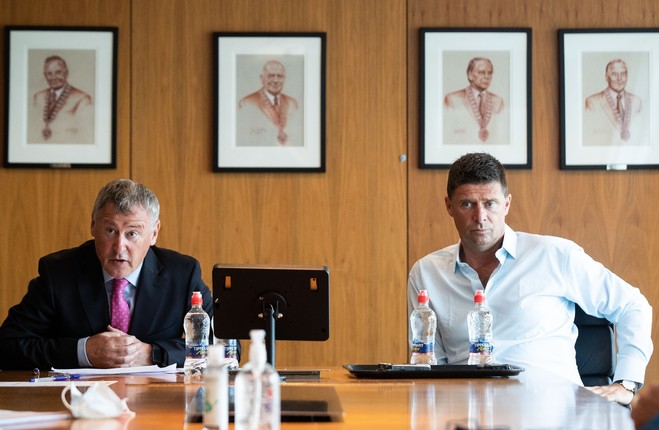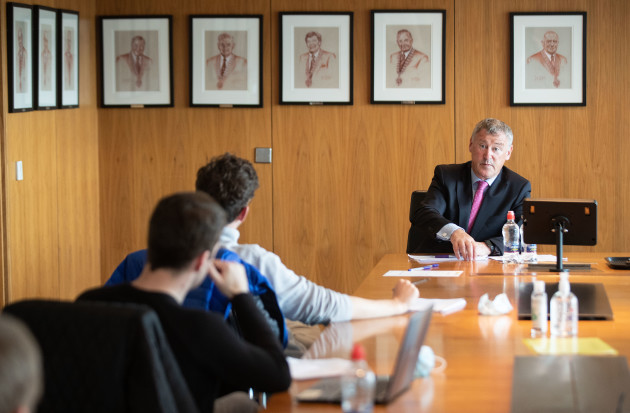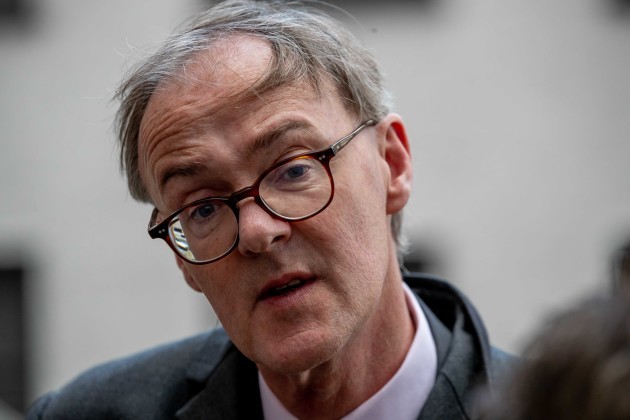FAI EXECUTIVE DUO Gary Owens and Niall Quinn insist there is no “Visionary Group” takeover of the FAI, as the Association moves into a crucial three weeks in its efforts to ensure its future.
Owens and Quinn are serving as interim CEO and Deputy CEO respectively, and both, along with independent chairperson Roy Barrett, were part of a “Football in Ireland Visionary Group” that last year published proposals for an independent-run League of Ireland.
Speaking to the media today, Quinn downplayed the Group’s work, saying they did not meet again after their proposals for the League of Ireland were published following Shane Ross’ “stakeholder forum” at the Mansion House last May.
“That night I got in touch with everyone to say, ‘that’s it, this thing isn’t for us’. My enthusiasm for getting involved [diminished]. I realised ‘This is a waste of time’.
“Roy [Barrett] became independent chairman, Gary [Owens] gave me a call and, I said ‘that’s interesting’ then I was brought in. I realised straight away that this was an uncomfortable place to be, in one way. It was in such a poor state. I remember having a conversation with Gary, ‘People aren’t going to trust us, people are going to knock us but let’s do the right thing’. That’s how it came about. The Visionary Group was long gone.”
Owens said he has never attended a meeting of the Visionary Group.
Although Quinn says the Visionary Group did not meet again after May, they kept their League of Ireland proposal alive after that date. The Group presented their plans to clubs at a meeting at FAI HQ in July, and in October issued a strong rebuke to an FAI statement claiming they had withdrawn from the process of working with clubs on a new format for the League.
Anxieties among rank-and-file members of the FAI are further raised by a proposal that the Association alter its board to compose of six independent directors and six directors elected from football constituencies. The present split is four/eight.
In the event of a split decision at board level, the independent chair Barrett has the casting vote. Neither Quinn nor Owens sit on the board.
FAI Council member James Kelly – who called for a special Council meeting on Friday to discuss the terms – called this agreement a “ticking time bomb” that “threatens the very existence of our Association as a sovereign body.”
Owens was at pains to point out that control of the FAI remains vested in voting members at the AGM, who have the power to remove a board member if they wish.
“We’ve got to eliminate the misunderstandings that are there, and there are a lot of misunderstandings, from Niall, myself and Roy trying to take over the Association, which we can’t do.
“The Association is fully under the control of the AGM. I think that when they see the process that we’re going to go through and the prize that we’re going to get it: a big prize, which is significant funding that is going to keep the Association solvent so we can invest in grassroots. There are quite significant benefits. The price that people have to pay is they have to agree to six and six independent directors.
“If they don’t like that, at any stage they can change it. They have the ultimate authority. If the six independent directors cannot convince them in time, they will have good reason why they can defend it. If the independent directors are not adding value, I think they’ll have every good reason to challenge that.
“At the moment they are challenging it when we need the money without any reason to determine if they are going to add any value or not. We do have a challenge to convince people but we have to eliminate any misunderstanding. Council have a lot of power which maybe they felt was being taken away from them, which is not the case.”
Adopting the six/six split is one of the agreed terms of a Memorandum of Understanding (MOU) signed by then-sports minister Shane Ross and Roy Barrett on 30 January. With the FAI facing debts of €63 million and the threat of insolvency, the Association agreed a bailout deal with the government and a new loan arrangement with Bank of Ireland, subject to the adopting of the reforms in the MOU.
Bank of Ireland agreed a loan arrangement worth a total of €52.5 million with the FAI – €24 million for the day-to-day running of the FAI and the remainder secured against the Aviva Stadium – while the government agreed to double State funding to €5.8 million and provide an interest-free loan of €2.7 million over three years to meet repayments on the Aviva Stadium. The government have since agreed to grant the FAI a fee of around €10 million to meet Covid-19 shortfalls, but all are contingent on adopting the reforms in the MOU.
The reforms must be passed by a two-thirds majority at an EGM on 31 August.
Barrett emphasised the importance of the FAI passing the reforms in a letter to Council members last night, warning them a failure to approve the reforms would leave the FAI insolvent.
In that letter, he listed a series of potential consequences, including the expiration of the FAI’s membership of Uefa and Fifa; the seizure of the Association’s shares in the Aviva Stadium; the loss of some or all staff jobs; and the voiding of all agreements with clubs and leagues across the country.
Barrett also sent Council members a letter from Fifa and Uefa endorsing the proposed reforms. This follows similar endorsements of the changes by SIPTU – who represent FAI staff – and the new government. New sports minister Catherine Martin and her then-deputy Dara Calleary wrote to the FAI on 9 July to warn them that there would be no renegotiation of the terms agreed in the MOU with Ross.
“We wish to confirm for the Board that the new Government has no intention of entering any discussion with the FAI or other stakeholders on the terms of the [MOU] signed in January”, read the letter.
There has, however, been a tweak to one of the contentious terms in the MOU – a requirement that Council members’ with more than 10 years’ service resign their position at the next AGM.
The MOU requires the FAI to change the process for Council membership “with a view to retiring Council members with greater than 10 years’ service by July 2020.”
The FAI are now taking a slightly different approach, whereby all Council member will be subject to a Fifa-designed fit-and-proper person test, and if they pass it, can remain on Council regardless of the length of their tenure. Niall Quinn said today that members with more than 10 years’ service “could” stay on if they pass the fit and proper person test.
The fit and proper person test is included in Fifa’s “Electoral Code”, which the FAI are seeking to adopt.
Owens said allowing members with more than 10 years’ service stay on does not represent a change to the MOU, but rather is how they are interpreting the rule.
“The MOU is not going to change. What is going to be applied, though, is in relation to the ten-year rule is the way we adopt the Electoral Code to that ten-year rule. There’s always been the spirit of the interpretation that we were going to adopt the Fifa principles.”
Regardless of whether that tweak is perceived as a fundamental change to the terms of the MOU, the contentious six/six split won’t be altered.
Owens said this change was agreed to on the insistence of the government. “It came from the government. They said if you want the money, we need to be convinced you have the right skillsets around the table.”
The six/six split would make the FAI an outlier in Irish sport. The Olympic Federation of Ireland has two independent members on a 13-person board, while the most similar is Cricket Ireland, who have five independent directors on their 12-person board.
Owens did not comment on the composition of other sporting boards, saying, “all I can comment on is we had a serious situation and we have to build back trust and build back reputations. Our requirement was to convince people we have the right skillsets around the table to manage a loan of €52.5 million.
“You need people with very strong football skills and very strong business skills as it is a business. When you are dealing with the level of money we are dealing with and the complexity of that money, it’s a very serious business. It needs to be managed and treated as a serious business and that’s what the people giving us the money want us to do.”
The government’s insistence on a six/six split came only six months after they endorsed the FAI and Sport Ireland’s Governance Review Group, which recommended a split of eight football directors and four independent directors. When asked what changed to prompt the government to push for an additional two directors, Owens cited two factors.
One was the realisation of the true scale of the FAI’s financial position – debts of €63 million were made clear following the publication of 2018 accounts in December of last year – and an audit of the FAI’s governance conducted by accounting firm KOSI. The completed KOSI report was seen by FAI board members and forwarded to An Garda Síochana but has not been published due to legal reasons.
Owens agreed when asked whether the revelations in the KOSI report about the FAI’s financial controls, governance structures and audit oversight are significantly worse than what is already in the public domain. “Yes. It was serious.”
Owens also refuted a claim made by Fianna Fáil TD Marc MacSharry that the MOU was signed on 30 January without being discussed at a board meeting earlier that day.
“The board members had the opportunity to review what the terms and conditions were, and they did sign off on it. They didn’t sign off on it afterwards, they signed off on it beforehand. [Marc MacSharry] is wrong on that.
“Did they like the terms and conditions is a different question. But the MOU was basically put in front of us and the board signed it. More importantly, the Bank of Ireland agreement was signed by the board with the MoU as a condition of it. It was approved by the board members in advance of it being signed. I would say reluctantly approved, but it was approved.”
The FAI are currently hiring for a full-time CEO, although Owens refused to be drawn on whether he has applied for the role.
“My focus at the moment is getting all this out of the way. Nobody is going to come in and take the job if it’s not around. I’d say it will be September when the CEO process will take off and finish.”
Quinn’s initial contract as Interim Deputy CEO expired at the end of July, but said he will remain in place until the crucial EGM takes place on the last day of August. “I’ve been asked to stay on certainly until the EGM takes place because none of us might be here after that if things don’t work out. I’m happy to do that, I have other interests as well which I’ve put on hold. I can’t answer further than that.”



